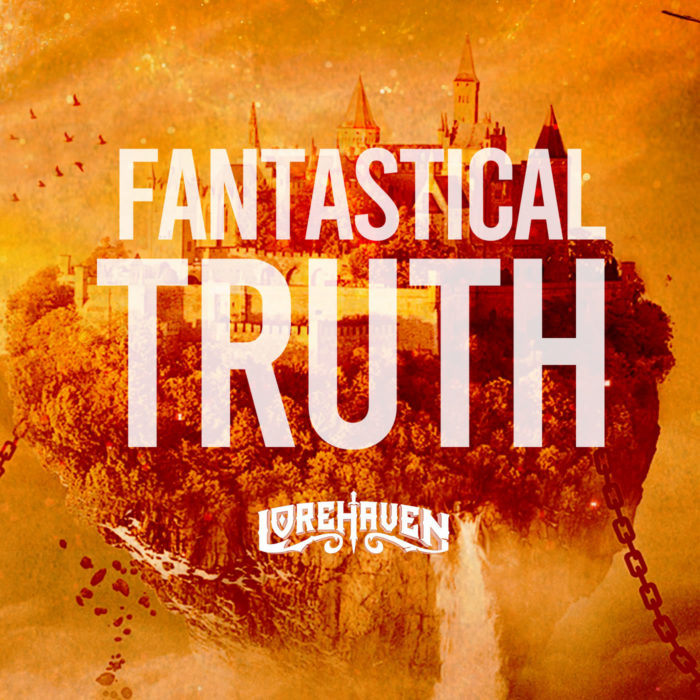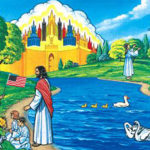When You Long For New Earth, Start Biblical and ‘Normal,’ Then Dream Bigger
Christians can only glorify Jesus by dreaming of his future After-world in biblical ways: starting with “normal” hopes, then speculating beyond.
E. Stephen Burnett on Apr 21, 2020 ·
6 comments
Zack and I continue this month’s Fantastical Truth podcast series, Epic Resurrection, with today’s release of part 2!
Podcast: Play in new window | Download
As before, I’ll show here an excerpt from the complete show notes.
Epic Resurrection series
Concession stand
- Some verses may apply to a literal millennial kingdom. But why stop there?
- Again, we’re going to stay out of the “end times” debates. What’s after that?
- Why start by emphasizing New Earth’s “normalcy”? Because miracles start here.
- All other concessions (materialism, freedom to explore) are in episode 12.
We will explore:
- Scripture promises the future, literal renewal (not replacement) of creation.
- Let’s start talking about the “normal world,” and only then speculate further.
- Always stay Scriptural and focused on King Jesus, architect of the Afterworld.
Why New Earth isn’t a non-Earth
- 2 Peter 3:10’s reference to judgement fire purifies, not obliterates Earth.
- Much (accidental) ill has done by old translation phrase “burned up.”
- Prophecies in OT and NT emphasize continuity: natural wonders and cultures!
- “New Earth” does not mean “non-Earth,” just as “new body” doesn’t mean “non-body.”
- “Well, we can’t know so it’s best not to imagine.” Scripture never offers such warnings.
- “This world is not my home.” If world means age: true. If world means planet: false!
- If God wanted to replace his creation with an alt-universe, he’d have said so.
What it’s good to dream of New Earth
- Like with resurrection, it’s good to practice biblical imagination of New Earth!
- This biblical imagination “lights up” normal life on this Earth.
- Instead of seeing our world as disposable, we start to see it as God’s.
- Instead of seeing our world as boring, we start to see more everyday delights.
- “The Earth is the Lord’s, and the fullness thereof” (Psalm 24:1). That fact does not “expire”!
- Any sin that lasts forever (such as greed, lust, or selfishness) would end up destroying a person.
- Only eternal happiness in holy, adventurous service to Jesus makes sense for eternity.
- Jesus Christ is the center of the afterlife, and the Afterworld that comes after that.
- Everything we do will be worship for him, not just creation, but “subcreation.”
Next on Fantastical Truth
If you bring back God’s creation forever, what about human creations, such as art, books, music, stories, poems, websites, and podcasts? Will these get burned up in that purifying fire? In our next episode, to finish this series, we will link this journey with your journey as a Christian fantastical fiction fan.
Meanwhile, join these fantastic events
This Thursday, April 21, I’ll host a webcast for Realm Makers.
- Realm Makers hosts several such gatherings, anticipating the annual conference in July. (No, this has not been cancelled.)
- Mine is called How Did You First Find Fantastic Fiction?, inspired by listener and reader feedback in this podcast episode.
- Click over to reserve your spot and set up auto-reminders for the webcast start at 8 p.m. Eastern time.
 Lorehaven is giving away two digital copies of Tosca Lee’s The Line Between.
Lorehaven is giving away two digital copies of Tosca Lee’s The Line Between.
- All you need to do for a chance at getting this pandemic thriller is to be a free subscriber of Lorehaven magazine.
- Lorehaven reviews The Line Between: “Its road-trip quest drives fast through mad territory and never once feels bogged down in snowbanks.”
- We had explored pandemic fiction and other hard issues in this podcast episode.
Godspeed!
Stephen












































Relatively short comment here:
1. If elements of creation are destroyed, then the Old Earth will be destroyed. II Peter 3:10, 12 talk about the “elements”–apparently “building blocks” of all matter, being destroyed. Burt up Earth isn’t key to the meaning of the passage–destroying elements seems much more important.
2. The “burt up Earth” idea isn’t pivotal to understanding future Earth anyway. Like a painting that is destroyed and a new painting is done in its place, the new painting may be radically different from the old. Or may look exactly the same. Destruction of the original neither proves nor disproves simularity in a new act of creation.
Likewise retaining the Earth that exists now and refining it does not prove the new Earth will be exactly the same or even similar. A house stripped down to its foundation and rebuilt can be radically different from the original. Keeping the same foundation proves almost nothing about the form of the second house.
3. The exact nature of the future eternal state is partially unknown. Speculation about it isn’t necessarily harmful, but it’s generally bad to say a text can only be read one way when it can legitimately be read more than one way. It is not certain that the New Earth will be broadly similar to the old. Some small indicators seem to imply it will be quite different, if they are taken literally. No sun, no sea (Mediterranean, perhaps), gigantic New Jerusalem that would collapse under its weight in our world…a few other things…
Similarly brief rejoinder:
1. Except Scripture-interpets-Scripture. Other texts, especially Romans 8, directly refer to “the creation itself” being set free. I encourage word studies (such as those I’ve read) about this text. This coupled along with other direct promises, and the Bible’s stubborn refusal to refer to creation as some permanently corrupted thing that must be destroyed-and-replaced, gives the advantage to presuming overt continuity between this world and the next.
2. Scripture does not presume mere “similarity” between this world and the next, but continuity of God’s original created material. Just as our bodies will be our bodies, the very material miraculously reconstituted and made-new, so will be creation. Jesus’s resurrection —> our resurrection —> creation’s renewal. Continuity persists. No one’s human body is destroyed-and-recreated; why then would we presume this only applies to the material universe? Furthermore, we cannot and should not dismiss the Scripture’s explicit language framing New Heavens and New Earth in earthly terms. This is all stuff that we covered, even in brief, in this episode.
By contrast, one might as well object to the teaching of resurrection by saying, “Well, you have to die first.” Of course we do. “And that death is really really serious!” Of course it is. “Your body could decompose into almost nothing!” Of course it will. Christians have died in fires and worse. “Fire can blast your body away into nothing, so how can you say the resurrection will restore the literal material content of your old body?” Easily: God is outside of time. He can literally wind back the clock and reverse destruction.
Which may be the biblical imaginative solution to our dispute. You can keep your “absolute, total obliteration of all the elements” that you believe is important to maintain, and yet it is clear that in some way God will recover these elements to preserve and renew creation anyway, so that “the creation itself” will not be “nuked into oblivion and replaced with some other existence,” but will as the Bible directly promises “be set free from its bondage to decay.”
3. Of course the future eternal state is partly unknown. We don’t know if God will created unicorns or bacon trees, or let us colonize planets. However, we must not read any prophetic text describing New Earth in isolation, whether it is 2 Peter 3:10 or Isaiah 65. Get too excited about having your own farms and vineyards? Then remember this old Earth must undergo a fire-purging first. Get too esoteric and mystical about the unknowwwn future paradise (as many Christians have done, to their doctrinal and practical detriment)? Then recall that it will also have “ordinary” earthly things like farms and vineyards.
This in fact is exactly the sorts of things that people began doing in the book of Genesis, with an eye of expanding from the garden to the city. Again, there is no biblical hint that this original, pre-Fall mission will be obliterated in favor of some alternative, wholly-unknown, “best not to speak of it” human purpose.
Many, many pastors and writers (who are skilled in not only Greek reading but contextual views of Jewish imagery, etc.) have explained the “no longer any sea” reference, along with the very likely metaphoric dimensions of the New Jerusalem imagery. (To be sure, everyone’s going to expect literal streets of gold! If those weren’t literal forecasts already, then folks will make them.)
Again: given that Scripture never once presumes or theologically argues the overall destruction/replacement of the material world, but actively presents the opposite view that God loves his creation and won’t blast it all by fire. In all of Scripture, fire targets sin, not stuff. “The creation itself” groans to be set free from its “bondage to decay,” not its bondage to being actively sinful. This, rather than limited reading of single words in single texts, ought to guide us—and illustrates the value of not only understanding languages, but reading those words in context of chapters, whole books, all of Scripture, and the overall direction of Christ’s gospel narrative of which all the Bible is celebrating.
John Piper goes into this even more effectively in his sermon, “What Happens When You Die? Glorified and Free on the New Earth.” Much of this material also appears in his book Future Grace, chapter 30. One key quote:
From there, Piper rightly moves to Romans 8 (as I’ve done, likely following this example, because believers in local churches and ministries ought to sharpen one another in these regards), and lets Scripture interpret Scripture (as it should be done).
Randy Alcorn also surveys the “destruction means obliteration” part in chapter 15 of Heaven (PDF), contrasting this view with the Bible’s constant and clearer emphasis on the restoration (not replacement) of creation that follows the fire-purge. Some key quotes from this chapter:
I commend this great stuff to thee. (Edited for clarity)
Hey brother,
The difficulty I’m having here is not me thinking you are wrong, definitely wrong, period. But rather, you are definitely assertive about things that are not actually proven or one hundred percent clear. As if your position is FOR SURE, definitely right, and anybody objecting is definitely wrong.
For example, you say, “Scripture never once presumes or theologically argues the overall destruction/replacement of the material world”…and that’s a statement in dispute here. If II Peter 3:10 and 12 refer to the destruction of the elements and that means everything will be destroyed (which is what it seems to plainly say if you read pretty much any translation other than the ESV–or the original Greek for that matter), then the Scripture actually says everything will be destroyed. That’s a statement to build a theology out of, rather than taking what you think Paul meant in Romans 8 and saying Peter could not have meant what he actually said. Doctrine should be built inductively off of what Scripture says, rather than deductively, as in “I’ve got a concept and I’m going to shoehorn everything I read into this concept.”
Note that Revelation 21:1 says the Old Earth will pass away, without saying how, but doesn’t say the New Earth is exactly the same. It certainly has similarities! There’s a city, with gates, and people in it and a world outside it. We see the similarities from a literal read–but a literal read also yields differences: no sea, no sun, etc. A metaphorical read leads us in essence with no idea if similarity is more important or difference. It all depends on how you frame the metaphor. But you seem (from what you said, though I’m not sure, so I used “seem”) to be willing to be literal about similarities, but metaphorical about differences! Which I think is an inconsistent and problematic method of interpretation.
However, in a way we’re having a Ship of Theseus argument here, though I don’t know if you perceive it. I’m saying that a second creation of the same or similar design IS the same creation for all practical purposes, even if Theseus’s ship has all its planks replaced. The form, the concept of the ship (i.e. the creation), its existence as an idea, especially when we are talking about the mind of God preserving continuity, doesn’t require the same literal matter to reassemble for Creation to be redeemed. Creation can be redeemed even if it is destroyed. We likewise can be resurrected even if the exact matter that made us is never put back together again–even if we only have the pattern of who we are, the idea–even if the final form of that idea is substantially different from what we would imagine it to be. In fact, perhaps matter itself will have different properties from what matter has now, so using “exactly the same” matter would be impossible, because nothing will be exactly the same.
Am I saying I know for sure that we will be made of matter different from what we know today? Nope. But I think it’s possible.
As for imagining what heaven will be like, I wouldn’t say we can’t do that. But we stumble into error if we assert things as absolutely certain about what we imagine that in fact are not so absolute and are not so sure. Such as, “Scripture never once presumes or theologically argues the overall destruction/replacement of the material world.”
That’s an interpretation, not a fact.
I’m saying this for clarity’s sake, not because I think for certain you are wrong–but rather that your certainty is off-base.
There is I suppose a broader issue of how we should think about this world and how we should consider ourselves in relation to it. But I’m focused on drawing my doctrine from Scripture rather than worrying about implications and then reading back into texts. FYI.
Let’s really hope I can keep this brief (as we wrap up?):
(Narrator: He did not keep it brief.)
But I’ve shared several sources that point to this fact that restoration, resurrection, and renewal (not “reboot, obliterate, start over from scratch”) are intrinsic biblical concepts. These aren’t notions snatched from outside the Bible and then read back into the Bible. In fact, the “reboot, obliterate, start over from scratch” concept is the alien one.
Alas, this I cannot help. Yes, I’m pretty sure I’m right on this one. Still, defining-resurrection is a second-tier doctrine, similar to the need for Christians must define the Trinity. Accepting the Triune God and the Resurrection, however, qualify as first-tier doctrines (though we may be confused on particulars or even accidentally deny biblical definitions of these). So if you detect any “I would break fellowship over this one, so-called ‘brother'” nonsense in my tone, I assure you it’s not at all intended.
I’m speaking of Scripture’s overwhelming support for redemption/renewal/restoration (over and against “burn it all down and start over”)—across all of Scripture. Again, I’m presuming here that Scripture-interprets-Scripture. One may choose to get stuck in a particular view of 2 Peter 3:10–12, but it would absolutely need to align with the rest of the Bible. Otherwise you’d have yourself a Blatant Contradiction.
I have no issue with “destroyed.” It’s clear that this physical universe must, in some sense, die. I’m saying: It’s coming back, the selfsame universe, with material and metaphysical continuity with the old universe. Frankly, if you’d continue objecting to that, then when I say, “Christians are going to be resurrected in their materially same bodies,” you might as well insist, “But we have to die first!” Yes, of course we have to die first. I do not deny death, for Christian persons or the kind of “death” prophesied for the physical universe. But God is outside time. If you insist on “dissolving” as a complete obliteration (effect) by the fire (the cause), then he is fully able to rewind the process and bring it back. Pretty clever solution, this. Similarly, Jesus promised physical resurrection for all who believe in Him, regardless of whether their bodies had been reduced to ash. God will still bring them back, and their very eyes, like those of the Old Testament saint Job, will see him.
In fact, it’s more questionable to fix on a particular view and interpretation of a single verse or isolated segment of Scripture, either with the Greek or without it, and without an eye toward all the Bible: i.e. what I’ve called the constant emphasis on renewal, resurrection, and restoration, explicit in those texts and elsewhere.
Again: Scripture must interpret Scripture. It also helps to have aid from faithful teachers who have not only studied particular texts with an eye to the Greek, but have studied Greek language and culture and historical context and genre and beyond, over decades, and share their wisdom with members who are in local churches and local teaching.
Amen. But I think you’re the one with the “nuke it from orbit and start over, without material or other kinds of continuity” shoehorned-in notion. One must be aware: this is a very, very powerful set of ideas that have derived from plainly pagan conceptions of the universe. (I’m not saying you’re a pagan! Just that these are ultimately pagan ideas.)
Of course it’s not “exactly the same.” Now you’re just misreading me.
New Earth will be this Earth, made new. That means it will be the same, but incredibly upgraded. Expanding on Alcorn’s favored car metaphor: a hyper-skilled mechanic might rebuild your Camry into a Hummer, but it would be absurd to insist the Hummer isn’t a four-wheeled vehicle like the Camry was.
I can link to other articles about “there was no longer any sea,” because this does require special explanation.
This, by the way, is why I will constantly assume that (1) if it’s not sinful, (2) if it’s something God made and called good, (3) if it’s not specifically mentioned in the Bible as something that does not directly continue in New Earth (i.e. marriage), then it’s presumed in New Earth—as opposed to assuming it’s not there because “we all know” the place will be entirely different, alien/inhuman/surpassing any human conception, et cetera.
It’s the sun comment, however, that’s especially interesting. Check the verse again: John the revelator doesn’t actually say the sun ceases to exist. (Around what else would New Earth orbit?) It only says the city (which is apparently some kind of fixed geographic environment within this larger world?) has no need for a sun or moon (Rev. 21:23).
You continually presume, however, that Scripture assumes creation will be destroyed—when the Bible is constantly, in words and in images, using images of continuity, renewal, restoration, and so on. 🙂 One verse, with what you’ve conceded has more than one interpretation, does not overthrow all of these more specific/clear verses about creation’s fate.
Anyway, we both get our way if we consider this simple fact: that God is infinitely outside what we call the fourth dimension and can literally rewind time itself to reverse the effects of decomposition and destruction (of the human body) or the effects of the fiery dissolution of elements (of the universe). If we can make up superheroes who do this with timeships (such as Doctor Who) or magical amulets (such as superhero wizard Doctor Strange), then it isn’t hard to imagine that God himself will do this.
Again, I’m with you so far …
Made new? Yes. No more sickness, scars, missing limbs, or weakness.
But “substantially different”? No. This is not a biblical concept. God made the human body good, and there is no biblical cause (only some very spiritual-sounding assumptions) to presume that our final form will be “substantially different.” (Examples: it’s fun to imagine flying, phasing through walls, and such, but I’d view these as miraculous exceptions to the norm. Human bodies will have all the parts we can expect now, and won’t have wings, extra eyes, etc.) You seem to be lapsing into the fallacy of the excluded middle, e.g. since the “final form” cannot be “exactly the same” as now, then it must be “substantially different”—without room for the biblical category of “the same, but made new,” a mixture of same but different. But even this argument presumes we are trying to get to the end with logic. I am trying to draw from all the Bible’s emphases (following after several other godly folks who’ve already done this and to whom I’m indebted), and in so doing, reach their destination. (Though I often say more than they about the possibilities of popular culture in the New Heavens and New Earth—see tomorrow’s podcast.)
I agree. That’s why our vision of the New Earth must start more specifically with biblical promises, i.e. the “normal” stuff like farming, traveling, ships of Tarshish, some kind of cultural continuance (like kings bringing into the city “the glory and honor of the nations”). This is safer territory, and only from there should we launch outward (with qualifiers) and wonder if God will create new creatures and let us colonize planets.
Rather: fact, I say, fact, and so far unchallenged here. 🙂
You seem rather certain yourself. Unstoppable force, et cetera?
Here you do seem to severely misunderstand my purpose. What I’m doing is not “worrying about implications.” Rather, I’m saying, “Hey, this interpretation of an (at best) uncertain text does not align with what Scripture says over here.” The effort is about harmonizing Scripture, not bothering about “implications.” Really, I think you need to read my work again. Or don’t read it. Rather, check into the lengthier sources to which I’ve repeatedly pointed, such as Piper, Alcorn, and several others. We really ought to be doing that, rather than trying to hash this out using blunt-instrument comments—as if the body of Christ was made to debate this stuff solely on the internet—as if we’re doomed to reinvent the wheel as isolated individuals, ignoring the good work of faithful saints who are blessed to study these wondrous truths centuries ahead of us.
Thanks so much for this extended discussion on the redeemed physical creation. Something that irritates me is when mentioning some earthly pleasure, a fellow Christian responds, “But we’ll be beyond all that” in eternity. I’m sure they don’t realize how Eastern, even Gnostic , that sounds. God made nothing “common or unclean,” pronounced it all good, in fact, and “generously gives us all things to enjoy,” so there is nothing in the physical world, and our physical existence, that shouldn’t be redeemed for us to enjoy simply on the basis of “it gives you pleasure.” Not sure whether we’ll teleport into different locations (such as Jesus appearing in the closed room with the apostles) since the scriptural passage itself doesn’t differentiate that activity in his glorified body from his physicality and his eating. Regarding the latter, I love what someone pointed out. Jesus had just invited them to verify with their eyes and hands what they could see and touch, but then verified by eating what they couldn’t see: the resurrected existence of his internal organs.
[…] (such as: Heaven Will be the Happiest Place on Earth, The Top Six Myths we Believe About Heaven, When You Long For New Earth, Start Biblical and ‘Normal,’ Then Dream Bigger) His thinking has been influenced by Randy Alcorn’s book Heaven and Alcorn’s thought in […]